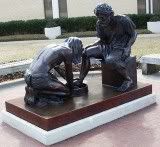An Interview with Dan Wallace, Part One
In light of some of the recent discussion over at the Conservative Reformed Mafia blog I thought it would be a good idea to check in with Dan Wallace to get his perspective on inerrancy, Christ-centered theology, the current state of evangelicalism and more. For those unfamiliar with Dan Wallace and his work, here is a brief biographical sketch from the blog he contributes to, Parchment & Pen:
"Dan has taught Greek and New Testament courses on a graduate school level s ince 1979. He has a Ph.D. from Dallas Theological Seminary, and is currently professor of New Testament Studies at his alma mater. Dan also serves at Stonebriar Community Church in Frisco, TX as an instructor to The Theology Program teaching elective courses in New Testaments studies. His Greek textbook Greek Grammar: Beyond the Basics is a standard text in seminaries and colleges. Dan is also an advisor and instructor at Reclaiming the Mind Ministries. Visit Dan’s website."
ince 1979. He has a Ph.D. from Dallas Theological Seminary, and is currently professor of New Testament Studies at his alma mater. Dan also serves at Stonebriar Community Church in Frisco, TX as an instructor to The Theology Program teaching elective courses in New Testaments studies. His Greek textbook Greek Grammar: Beyond the Basics is a standard text in seminaries and colleges. Dan is also an advisor and instructor at Reclaiming the Mind Ministries. Visit Dan’s website."
Jeff Wright: We've been having a little discussion about biblical inerrancy at our blog after I mentioned that I consider inerrancy to be a "secondary matter." Since misery loves company, I threw you under the bus too and recommended that people read "My Take on Inerrancy" since that has helped me in my thinking on the subject. Without asking you to repeat everything you said there, could summarize your view of inerrancy and why you prefer an inductive approach to this doctrine?
Dan Wallace: Jeff, this won’t be much of a summary, but it will be a different angle on things to help clarify my views. I want to thank you for the opportunity to do so.
When I was in seminary in the late 70s, inerrancy was all the rage. At that time, what emerged in the many volumes on bibliology were two quite different ways to frame the discussion. One view, the deductive view, championed especially by E. J. Young, was simply that since God is perfect, and since the Bible is God’s Word, the Bible must be inerrant. The problem I saw with that syllogism was that it was both circular and didn’t work across the board with other products of God. For example, consider this syllogism: God is perfect, and since I am God’s child, I cannot sin. Not too many folks would agree with that view—especially any who are married and whose flaws could be easily and constantly pointed out by their spouse!
The other approach was an inductive approach, championed by B. B. Warfield. He argued that there is solid historical and exegetical evidence to show that the biblical writers were trustworthy as doctrinal guides. And if they taught that the Bible was inerrant in the original, then either they needed to be shown to be untrustworthy as doctrinal guides in other areas, or inerrancy was true. What Warfield did was to show that inerrancy was not just a matter of the phenomena of the text (what most people would think as an adequate inductive approach) but was linked to the doctrines that the biblical authors embraced. Thus, to deny inerrancy (according to Warfield) was to deny that the biblical authors were trustworthy as doctrinal guides. This syllogism is the sort that can be attacked at one of two points: (1) The biblical authors are not trustworthy as doctrinal guides. If one argues that, he not only denies inerrancy (viz., the Bible is true in what it touches) but also denies infallibility (viz., the Bible is true in what it teaches). Those who hold to infallibility but not inerrancy are either inconsistent in their views or need to attack the syllogism at the second point. Thus, (2) the biblical authors did not teach anything that resembled inerrancy. A scholar the stature of Bruce Metzger recognized the inconsistency with the first view; he opted for the second line of attack, arguing that the Bible does not teach its own inerrancy...
To read the rest of Part One, click here.



No comments:
Post a Comment